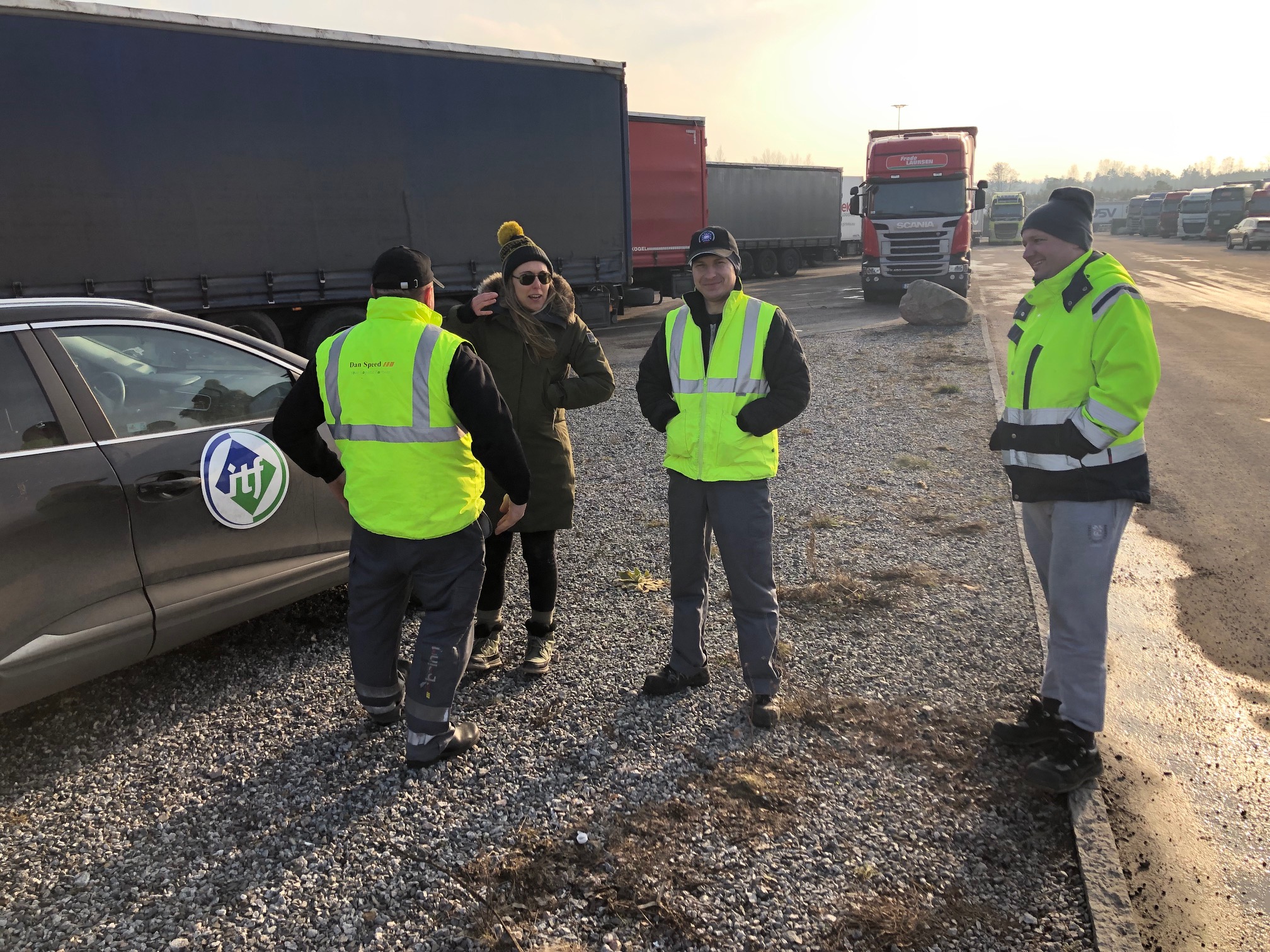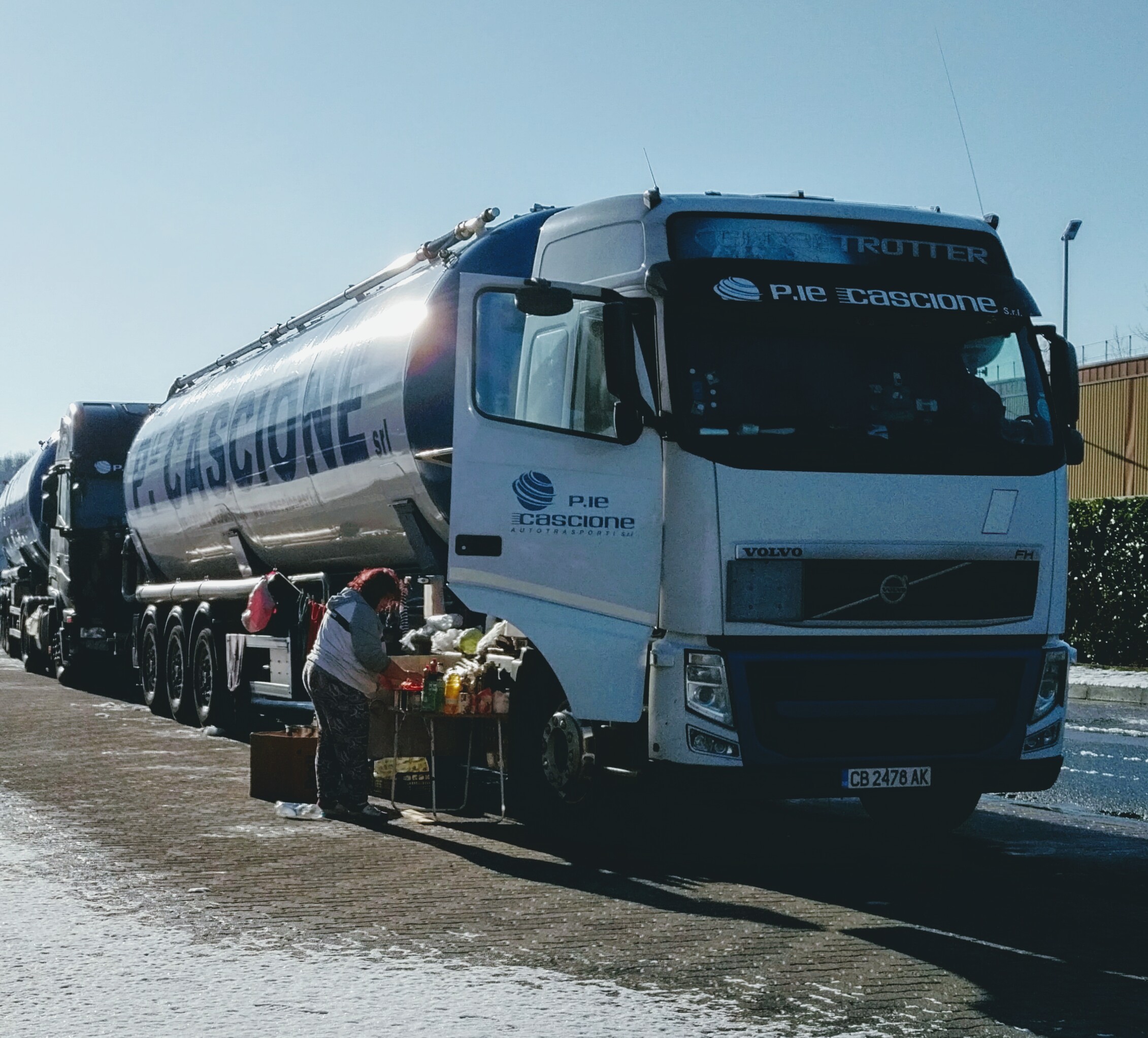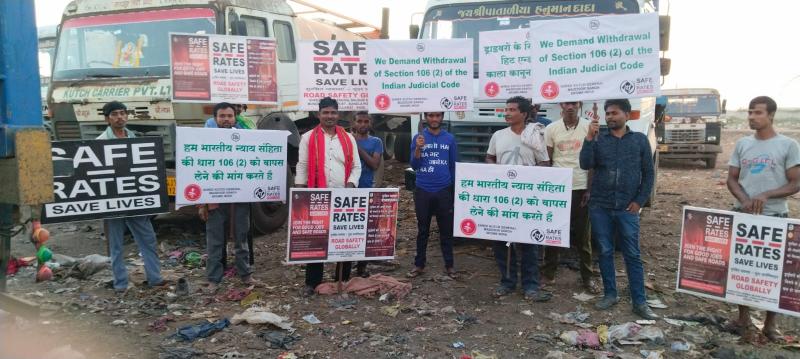The ITF is working with its unions in Europe to expose the hidden shame of Europe’s road transport industry. Drivers from Eastern Europe are brought to Western Europe to drive, they receive an hourly wage as low as EUR1.70, they have to sleep in the cab of the truck for up to eight months at a time, they wash and cook in car parks, they have limited access to toilet facilities, and are given fake papers to evade authorities. All the while they transport goods for some of the most successful and profitable multi-national companies in the world.

The grim reality of the European road transport sector
Mass exploitation and inhumane working conditions are rife within the European road transport sector. Companies eager to make a profit at any cost take advantage of the high demand for road transport. They charge large multi-nationals a decent price for operating their supply chains, but the money paid for the service is not fairly distributed to the drivers carrying out the work. Instead the transport operators use loopholes to underpay their workers, taking drivers from Eastern Europe on Eastern European contracts and using them to drive exclusively in Western Europe. This business model means they are able to pay low wages and social security contributions, while taking advantage of the right for EU members to work all over Europe.

For the last three years the ITF has been working in partnership with European affiliates to investigate the supply chains and the companies that are using these exploitive business models. Through field research and talking to the drivers we have found a pattern of exploitation consistent across the industry.
The wages
Most of the drivers come from Romania, Bulgaria and Ukraine and receive gross wages of between EUR310 and EUR375 a month. This is equivalent to an hourly wage of between EUR1.76 and EUR2.13 (assuming that a working day lasts eight hours and that there is an average of 22 working days in a month). To disguise the fact the drivers are paid under minimum wage the drivers also receive a net payment of EUR58 as a per diem. This daily allowance is paid as a lump sum and sits outside the basic wage - as a result no social security is paid on it. For example, pension contributions are only based on the EUR300 (approx) basic pay, making it very hard for drivers to retire.

Altogether with the per diems the money many drivers receive is no more than EUR1,740 per month. A driver resident in Western Europe can expect a salary in excess of EUR2000 per month with daily per diems on top, as well as the benefits of local employment (such as the ‘luxury’ of being able to go home at the weekends). The Eastern European drivers spend long periods on the road without seeing their families, and live in poor conditions.
The conditions
During one weekend on the road in Belgium, Germany and the Netherlands, ITF investigators heard from several different drivers struggling to make a living. One driver moving goods for major multinational companies said he had three young children at home, and was driving six months continuously between Norway and Portugal with no time off to visit his family. When asked if he sometimes spent the night in hotels he told us no, he only sleeps in the truck.
Outside a large logistics warehouse in Germany, we witnessed drivers washing and cooking in the snow. We asked the drivers why they did not use the facilities in the warehouse. They told us that the company does not give them access. One driver explained the only place to go to the toilet was a small shop, 10 minutes’ walk away but this shop closed at 20:00. The driver parked in this spot all weekend waiting to unload.
In a big car park close to the Netherlands-Germany border, in the shadow of large, state-of-the-art million-dollar DSV, XPO, UPS, TNT warehouses, drivers from all over Eastern Europe spend their weekly rest in their trucks, cooking and washing outside. The small service station (as with most services stations in Europe) charges EUR0.70 to use their toilet, which, on an hourly rate of EUR1.70, is not an expense the drivers can afford. Drivers end up going to the toilet around the back of their trucks or in nearby bushes.

Aren’t there laws to prevent this?
Yes, the European Union (EU) has issued several directives that state that this practice is illegal, but while the laws exist there is little or no enforcement.
- Cabotage rules say companies are not permitted to do more than three domestic transport operations in another member state during a seven-day period. However, with lack of proper vigilance from authorities the financial benefit of exploiting the rules far outweighs the risk of getting caught. Furthermore, the penalties if caught are minor in comparison to the profits gained. Breaking cabotage rules has grown to be a business model of the transport operators.
- The Rome 1 regulation says workers are entitled to the wage of the country where they habitually work. For road transport workers the habitual place of work can be hard to define and is easily covered up by scheduling tricks.
- The Posting of Workers Directive aims to promote the free movement of services and fair competition, and to guarantee workers’ rights. In theory it should mean that a worker posted to a country on a temporary basis could claim the minimum wage of the country in which they are posted. This causes problems in countries which do not have a legal minimum wage such as Sweden and the 'temporary' nature of the posting is also hard to define. The European Court of Justice is considering whether the Posting of Workers Directive applies to international road haulage.
- The Regulation on Driving and Rest Periods states that drivers must take a regular weekly rest period at least once in any two consecutive weeks. A previous judgment explicitly stated that a driver is not permitted to take this rest of 45 hours in their vehicle. Some drivers have an awareness of this rule, but member states do not prioritise enforcement of it. The companies benefit from this rule being broken as it means drivers stay on the road longer. Through isolating drivers in their trucks, the breaking of this rule has been one of the most profitable aspects of the employer’s business model.
- The Regulation on Driving and Rest Periods also sets restrictions on the length of time drivers can drive during any given day, week or fortnight. Data is captured on a tacho card fitted in the truck. To get around this, employers encourage drivers to remove their tacho cards to disguise how long they have driven for, putting the safety of the driver and the safety of other road users at risk. However, the chance of getting caught is small and even when caught the fine is insignificant when compared to the money made by this widespread breach.
Enforcement of the laws
European regulations are ineffective protection without proper enforcement from member states who show little appetite for increasing resources to properly police the rules.
Even in countries like France, where more strict checks are carried out, these rogue transport operators simply issue fake documents to deceive the authorities. French law requires that if you work in France you are paid the French minimum wage, but drivers are issued false paperwork to show the French authorities that they are earning French wages - when they are not. While clearly illegal, the drivers do as they are told for fear of losing their job.
Knowledge of their rights is required if any driver is to try and challenge an employer, it is doubtful drivers from Eastern Europe are fully aware of the legislation that, in theory, should protect them. Even if they were, without proper legal advice or funding, it is unlikely a driver would take it upon themselves to challenge injustices, most workers and are too dependent on keeping their job to risk taking on N employer alone.
It gets worse – human trafficking
Not satisfied with exploiting the low wages of Eastern European workers, road transport operators now advertise for drivers from the Philippines. Job advertisements say drivers will receive EUR2000 a month, a flight to Europe and access to an apartment.
Workers arrive to find no apartment, wages of EUR300 a month and the cost of the flight deducted from their pay check. They are forced to live in the cab of their truck, pressured to work long hours without proper rest and threatened by their employer when they try to leave.
Groups of Filipino drivers have been rescued from these conditions in the Netherlands, Denmark and Germany but still more are arriving and the agencies continue to advertise these jobs. The prosecution of these cases is tricky due to the definition of ‘trafficking’ in European law. Cases are hard to win in court because labour exploitation is treated very differently to sex or child trafficking and is much harder to prove.
One Filipino driver, brought to Europe by this deception, told ITF investigators that he preferred the conditions when he was driving in Saudi Arabia because there were better provisions for truck drivers there.
Another driver had injured himself in a road accident (the vehicles these drivers are given are often old, faulty and in need of repair). Without proper health insurance (which the employer does not provide) he was scared to go to hospital to seek help because he had no money to pay the hospital fees.
What can be done?
The companies at the top of the supply chain are either unaware of, or ignoring these conditions. They have the power and influence to change the practices of the transport operators that compete for their business.
They can reform the entire industry simply by changing their tendering processes, conducting thorough pre-checks of the hauliers they hire, carrying out auditing and monitoring of the companies to ensure that they meet standards and adopting remediation practices when companies are found to be in breach of those standards. This, combined with drivers organising and building union power on the ground, will create a bottom up and top down pinch on the middle men exploiting the system.
Unions in Europe can play a vital role in carrying out the field research necessary to investigate these exploitative practices. We need dedicated resources in unions across Europe to go into the field, visiting parking places, talking to drivers and mapping the supply chains.
Through gathering evidence, the economic employers can be confronted with the reality and lobbied into making changes that will reform the industry.
The more unions that dedicate resources to carry out this work, the more coordinated and influential the action will be.
The ITF offers training for unions interested in committing resource to this field work. For more information please contact: usher_lauren@itf.org.uk



